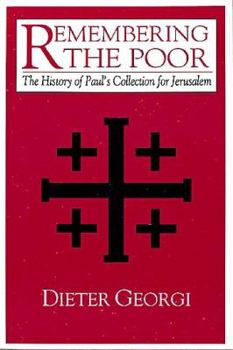Remembering the Poor
Select Format
Select Condition 
Book Overview
No Synopsis Available.
Format:Paperback
Language:English
ISBN:0687361176
ISBN13:9780687361175
Release Date:July 1992
Publisher:Abingdon Press
Length:232 Pages
Weight:0.65 lbs.
Dimensions:0.6" x 5.6" x 8.5"
Customer Reviews
3 ratings
why didn't I give it 5 stars?
Published by Thriftbooks.com User , 15 years ago
Georgi has a stellar reputation for historico-critical and for exegetical work, I have all his books. In both his earliest (Remembering..) and his latest (City in the Valley), near their ends, he replaces the religious infrastructure for his optimism, with secular/humanist assumptions. In my view socialist idealism based on secular/humanist motivations has been conclusively proven to fail, and is ill-advised even when based on religious motivations (pace Acts 4:32-5:11).
Only analysis of a central focus of the ministry of Paul.
Published by Thriftbooks.com User , 26 years ago
Professor Georgi brings a wide range of knowledge to this work. Initially I have focused on his essay; "Is There Justification in Money?" He describes the economy and culture of the Hellenistic/Roman world. He also illuminates Temples and religion in the Hellenistic world as economic institutions equivalent to our banks and escrow offices and court houses for registering property transactions and loan documents and receiving fees for these transactions.Dr. Georgi includes analysis of economy from Aristotle to John Maynard Keynes. He astutely differentiates Paul's relation to money, which is to build up the 'poor', from the normative Hellenistic relationship to money of his day, which is to generate profit/interest for the power structure.The question which I would like to ask my former Professor. Who are the poor of Jerusalem in the Jesus movement? Could not the whole Jesus movement be the poor? The nabim? When Jesus spoke to the rich young ruler did he not say, sell everything you own and give it to the poor? Did Jesus mean some abstract faceless collection of the poor? Or were the poor and the Jesus movement the same thing? This fits with the communal vision of the Church which we also see in Acts. When we take our line of thinking in this direction we are then confronted with the Essene community on the shores of the Dead Sea. How is this communal community the same or different than the Jesus movement? The other clear motiff in the New Testament is the anti-temple rhetoric of the Jesus movement; seen clearly in the oration of Stephen prior to his execution, and by Jesus' attack on the Court of the Gentiles on the Temple grounds in Jerusalem. This theme also needs more examination. Is Paul reflecting a new economy which benfits the common community of faith rather than generating interest/profit for the owners and controllers of capital? Does the Temple represent both capital and the Roman occupation in colusion? Is the Jesus movement opposing the temple capital structure, in a revolutionary way? This book is great reading! I appreciate the footnotes being in back of the text. Dr. Georgi has arrived at a place in his career where he is able to communicate bold original thinking about large social issues, rather than merely thinking about Greek grammatical structure which dominates too much New Testament scholarship.
Illuminates Christian economics with Paul's economics
Published by Thriftbooks.com User , 26 years ago
This is a ground breaking work that brings our contemporary economics into focus in the Mission work of the Apostle Paul. It also challenges simple capitalism and calls for a higher Christian econmics.This work does in fact look at the communities which existed in the Jesus era which self described themselves as the poor, as well as the righteous. The book briefly glances at the Qumran community and almost automatically excludes it from and differentiates it from the Jesus community of the poor. The book also briefly looks at the ethnic divisions in the Jesus community i.e. the Jewish and Greek split which allowed for the stoning of Stephan and the immunity of Peter/James the Just et al to continue their ministries in the Temple and in Jerusalem.Dr. Georgi wonders why the Galileans; Peter and the twelve are drawn back to Jerusalem to continue the ministry of Jesus movement. His answer is that they were filled with Eschatological enthusiasms.Christians not living a life within the academic realm might say that Peter and the twelve were empowered by the Holy Spirit and inspired by the great commission to specifically follow that strategy: "first Judea, then Samaria, and then to the ends of the earth..."I find this book much more satisfying than the recent work entitled; "James, the brother of Jesus." Dr. Georgi shows more respect for the witness of the canonical text. The writer of the book on James has an elaborate hermanuetic which essentially turns the text on its head and turns it inside out; and says that black is white. The writer on James the brother of Jesus does raise some interesting questions regarding the movement of the Hasidim; which while supporting Temple Worship in theory were opposed to the pollution of the Temple by the Sanhedrin/Roman ruling clique. Jesus cleansing of the Temple would seem to fall into a Hasidim (purifying) action. Or its opposite since he called for better access to the Court of the Gentiles. These are perplexing issues ! and we look for further research and writing from Dr. Georgi






